
Local News
Christian Church finds ‘sacred space between worlds’ on Monroe riverfront
At Riverfront Community Church, rituals with ancient roots celebrate the Christian God, the local community, and “the smell of BBQ and sounds of good friends praying and laughing together”
by Patty Snorkler (Saturday March 16th 2024 6:30 am)
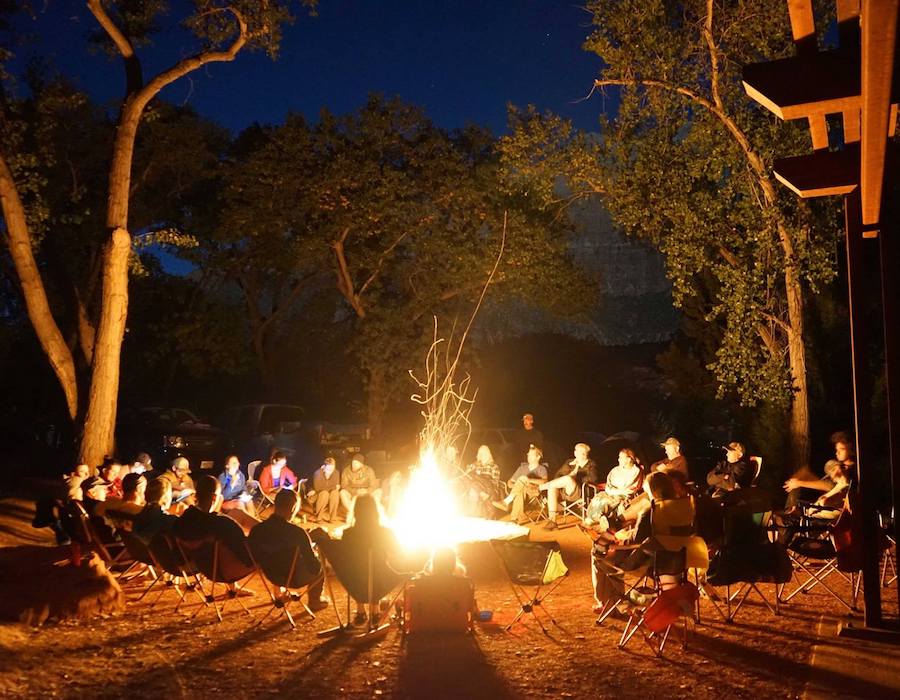
MONROE – You don’t become a child of God.
“You just wake up and realize that’s what you’ve always been,” Pastor Francesca Davis said. “And now you have a name for it.”
Francesca “Frankie” Davis, 58, leads Riverfront Community Church with Youth Pastor Rusty Andersen, 40. Based in Monroe, the duo guides a congregation of about two dozen Christians in person, with hundreds more online. On the first and third Sunday evening of each month, the riverside grounds adorned with statues of saint and woodcarvings come alive, as Christians stream in from all around Puget Sound.
The church headquarters sits along a gated gravel road, in the shade of mountain peaks and mammoth cedar trees. You can hear the buzz of electrical lines and the hum of the church’s beehives. A few hundred feet from “The Mother Church”, the Skykomish River roars.
In the back of the campus, Christians often gather around two circles – one grass, another cobblestone. Here, the sound of rushing water is replaced by laughter, worship songs, and a call to form a circle so the evening’s liturgy can begin.

Since 1979, Monroe has been home to the Christian church founded by Paul Rodriguez. Under Rodriguez, the “Flock” achieved federal recognition as a Christian denomination and tax-exempt status as a church. Frankie doesn’t know exactly why Paul chose this spot, as a move from Seattle predated her joining the church.
In 2012, as Rodriguez’s health declined, Frankie stepped into the role of lead pastor.
According to the Pew Research Center, roughly 6 in 10 American adults hold at least some “Christian” beliefs – such as prayer, miracles, charitable giving, and the spiritual value of all people.
“What we really want to do is live off the land, and raise our kids and pray and have cookouts – the smell of BBQ and the sounds of good friends praying and laughing together, you know?” Francesca said. “Wake up in the early morning, when the dew has fallen on the lawn, head to church … We’re children of God. That’s what we want to be. And so we live differently, and we have different values.”
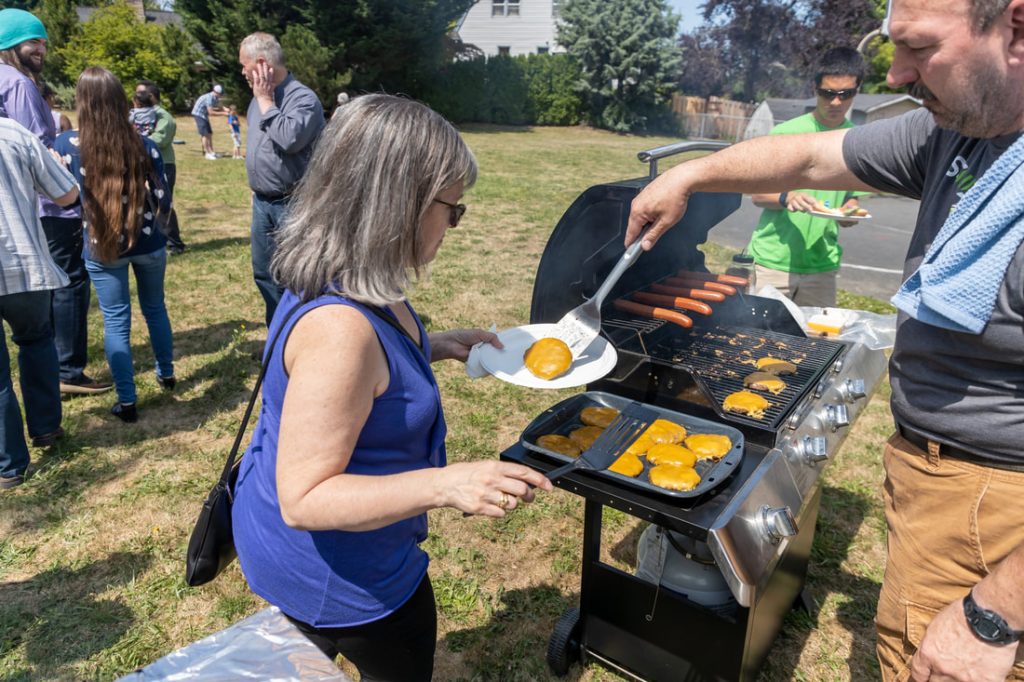
“I Had a Calling”
In the late 1980s, a friend left a book on “intercessory prayer” at Frankie’s house in Texas. She peeked inside and found a prayer for “meeting a soul-friend.” Curious, she prayed it.
The next day, she said, she met a man who described himself as a “pilgrim” from the Anam Cara organization in the U.K. He told her he had a vision of meeting a fellow “pilgrim” in Dallas who was going to become the leader of a “great house” one day. Frankie was initiated into a group of “neo-contemplatives”, where she learned ancient liturgies from all sorts of church traditions and intercessory prayer practices.
In her earliest memories, before becoming a “devout Christian”, Francesca recalls “receiving direction and information from the Spirit.” She was raised in the Church of Jesus Christ of Latter-day Saints, also known as the Mormon church. However, as she grew older, she found LDS ideals hard to believe.
When she took over Riverfront Community Church, some rejected Frankie as a leader, she said, simply because she was a woman and not Rodriguez.
“It was really hard, because when you have a church, people really are attached to the person, not the institution,” Frankie said. “I had a calling, and God was with me, and so I just kept following the Spirit and doing what He asked me to do.”
She aimed to make the church a safe space.
The famous Francis of Assisi was a medieval friar known for his love of nature and itinerate preaching. “That is the name God gave me,” Francesca (a female version of the Italian “Francesco”, Francis’ given name) said. “I was completely unaware of who Brother Francis was when I took the name.”
Considering Frankie something of a spiritual mother, many in the church adopt her affinity for the iconic saint, or choose a saint or some other important Christian figure for themselves as personal “champions of the faith.” Around Frankie’s neck is simple hemp cord with a small picture of Francis’ face, identifying her not only as a leader, but it also signals to others that she is a judgment-free person they can confide in.
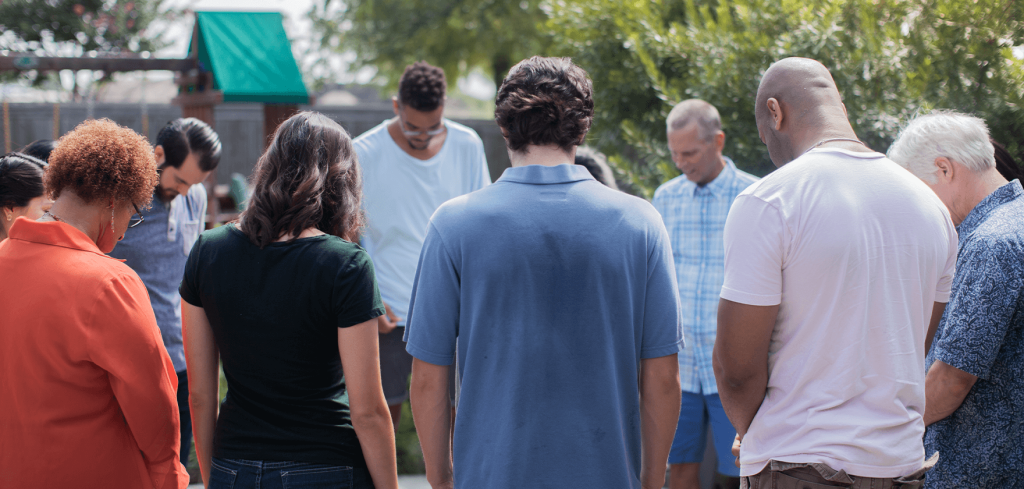
Francesca Davis and other members of the church still feel Rodriguez’s presence in Monroe. He died on Apr. 20th, 2014, exactly 35 years after founding the Flock. His final resting place is on the church grounds beneath a cross-shaped headstone with the inscription “Ad maiorem Dei gloriam” in honor of his favorite saint, Ignatius of Loyola: another mystic, theologian, and former soldier who, after a life-changing injury on the battlefield, began his spiritual journey using what he called the “Spiritual Exercises”: practices such as bible reading, meditation, and self-examination.
Francesca said Rodriguez was “charismatic, strategic, and unwavering.” He could command the attention of a room. Known as the “man with the steel spine,” he showed Francesca how to run a business and the church.
Rodriguez led a decade-long fight for the right to allow prayer in public schools. While Christian students were technically not banned from praying together in groups or in public on campuses, the federal government ignored petitions for school-sanctioned religious activities, something many Christians (including Rodriguez) believed was evidence of Americans losing their way of life. Some Christians believe American ideals were founded primarily on Christian values, though some Christians assert that it is inaccurate to conflate the two.
Rodriguez was instrumental in founding Ecumenical Magazine with the goal to “bring the (Christian) community together through news, voice and fellowship” and the creation of Bible Scouts, an alternative to Scouts BSA.
Both scouts and magazine remain active today.
“Protect this space”
Mark Forester moved to Monroe in 1979, where he leads a Sunday congregation at the Monroe Bible Church.
“At least once a year,” he said in an email, “I set up a PA system outdoors in Monroe, crank it up, and preach from the Bible for sometimes up to five or six hours in deep passionate worship. Those who come during that time experience teaching direct from the Scriptures. It’s unpopular, and may offend, but the Bible is the only source of truth.”
Despite some ideological differences, Forester has interacted with Flock members often over the past 45 years: hiking, celebrating birthdays or fixing appliances. Everyone in town knows members of Riverfront Community Church, but might not know about their doctrines, Forester said.
“We experience life together,” Forester said. “Some are real good longtime friends.”
Christianity draws from a rich history of various traditions in Europe, North Africa, and Asia – often a mix of Celtic, Greek, and Slavic traditions, along with personal experiences that are unique to each believer.
Some Christians practice intercessory prayer, specifically for physical healings of ailments and diseases, which is also seeing a rise in interest in the last decade, a cultural moment deemed “a revival” by some media outlets.
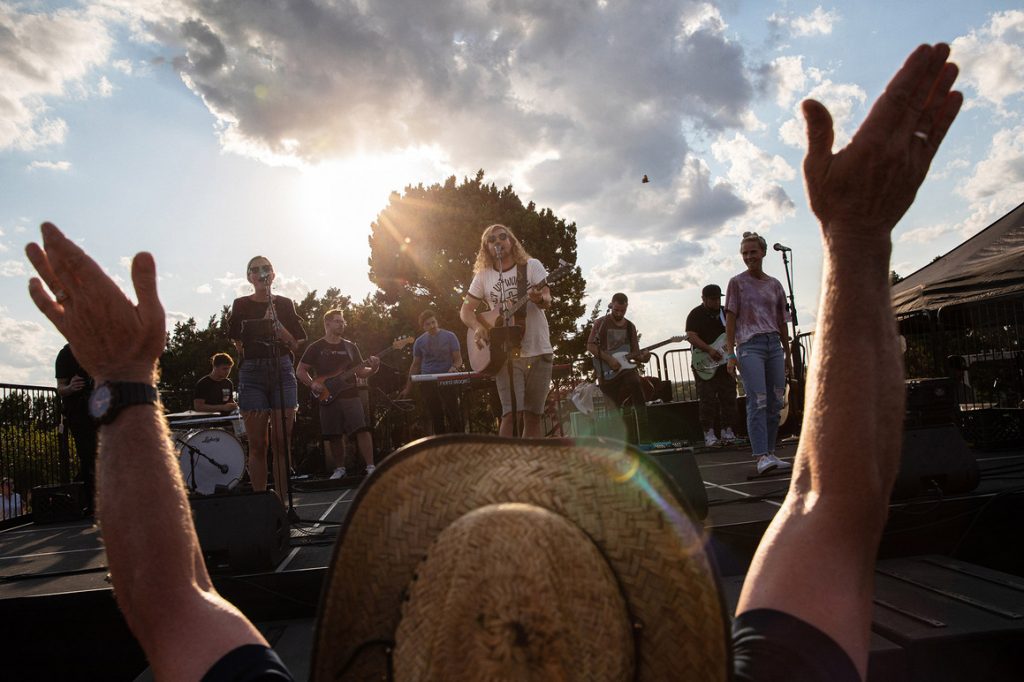
Revivalist Christianity, a “stream” found within the faith, often centers a service around long, intense periods of worship and singing, prayers for specific people and events – such as political leaders, international conflicts, natural disasters – passionate preaching, and an overall expectation of miracles and divine intervention. It’s not so much a denomination with any particularly creed or doctrine, though some historians point out that since the “Great Awakening”, this style of Christian teaching and worship is one of the largest and most popular forms in North America. Enjoying resurgences at different times throughout the 19th, 20th, and 21st centuries, “revivalism” follows the directives of the Holy Spirit, which many believe expresses itself through miracles, a Christian’s talents and skills, global events, and “spiritual warfare.” According to Francesca, within all Christian traditions there are stories of miraculous healings (everything from toothaches to cancer to disabilities to infertility to depression and anxiety), prophetic “words of knowledge”, “speaking in tongues”, interpretations of dreams, including visions of the future, figures from the bible, or even long-past believers like Rodriguez interceding for, and praying with, the living and present congregation.
Not all Christians are “revivalist” but usually, those who identify very strongly with “Holy Spirit” practice this style of worship and prayer.
A short walk from the indoor gathering place, Riverfront services usually start with setting “the Intention”, where practitioners can evoke God.
“Setting The Intention is to create a sacred space between the worlds, heaven and earth, and to protect the space from spiritual forces of evil,” Youth Pastor and Worship Leader Rusty Andersen said in an email.
Other prayers call for invocation. One person may receive the Holy Spirit and allow it to speak through them. After a “Holy Spirit Moment”, Frankie says she can usually only remember bits and pieces of the experience, if anything at all. Messages vary depending on the will of the Spirit, but often include words of encouragement during hard times and also celebration of current prosperity.
“Evocation is a prayer that brings Holy Spirit into the space,” Francesca said. “Invocation is a prayer that brings Holy Spirit into the body.”
Invoking the Holy Spirit takes preparation by first examining one’s “heart posture” and establishing a strong relationship with God. This is done by practicing spiritual disciplines, sitting under trusted teachers (those with “apostolic and prophetic gifts”) and serving the congregation, Frankie said.
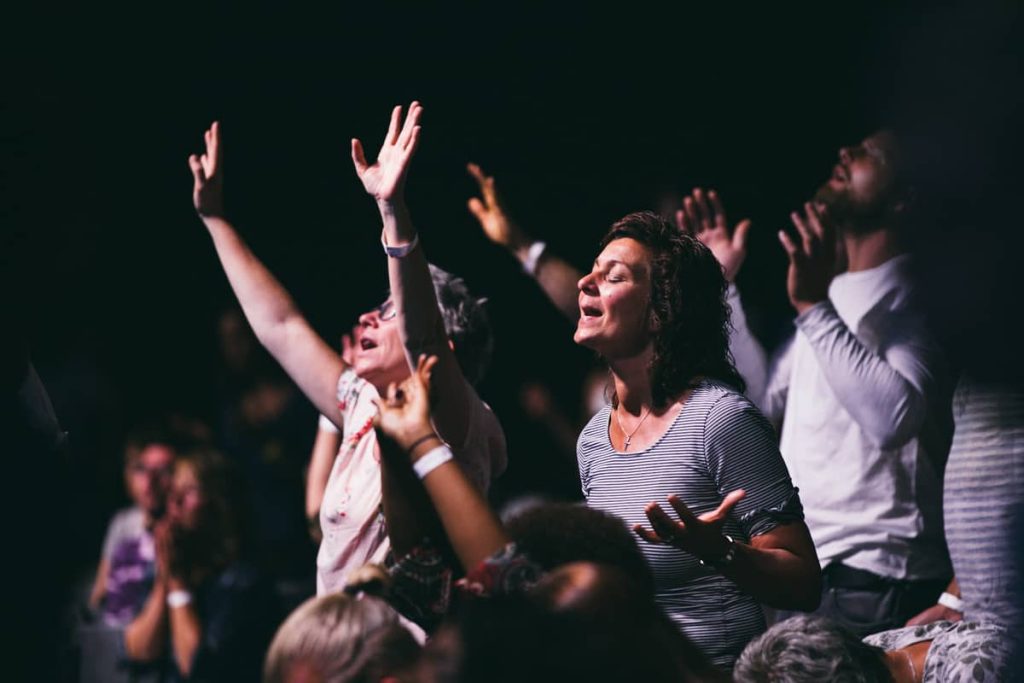
“It’s easy for Christians to forget our Jewish roots sometimes, but there’s an Aramaic phrase that 1st century Judeans would’ve used in prayer – Maranatha. It literally means, ‘to set a trap for God’. God wants your heart, so you must offer it to Him sincerely, otherwise He will not show up.”
Riverfront follows a liturgical calendar that includes many different forms of worship and prayer to keep Christians in tune with what God is doing. Different rituals call for different things: casual or formal attire can be worn, traditional hymns and contemporary worships songs can be sung, while necks and wrists are adorned with jewelry or tattoos of crosses, doves, lions, swords, and bible verses.
“I Felt the Spirit”
Rusty Andersen jokingly breaks down the Christian worldview into simple terms.
“Christianity is not a spectator sport,” Andersen said, laughing.
Keeping the faith, he said, is like running a race – it’s the most important race in existence.
Andersen has been a Christian since he was 5.
A fellow kindergartener named Jamie told him about the faith and invited him to a “seeker service.” Andersen has a vivid memory of walking down the aisle of the sanctuary, in a church called “The Vine”, to approach the altar with other new believers and make a decision for Christ.
“We invited God into our hearts,” Andersen said. “It was beautiful, and I felt the Spirit.”
Andersen’s friends and agnostic parents supported him exploring Christianity.
“They were so happy that I found meaning, that they just wanted to support me in finding meaning,” he said.
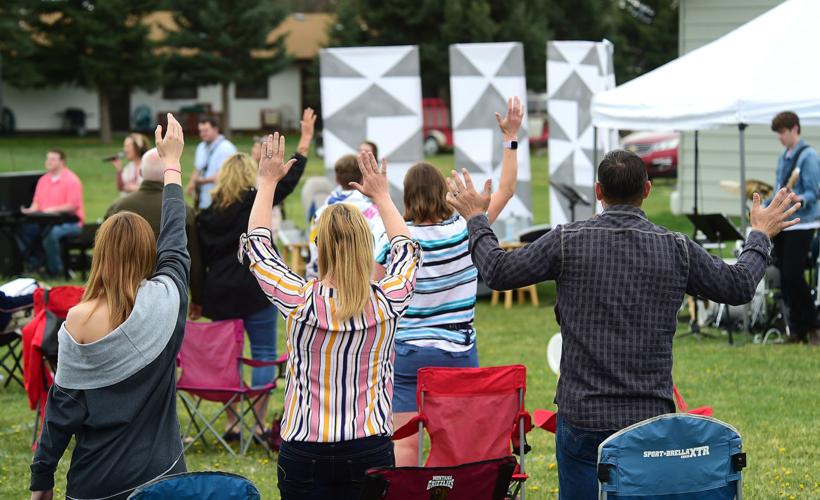
When he turned 21, Andersen sought a Christian mentor to teach him how to use his life for God’s purpose, but couldn’t find a good fit. While volunteering as a camp counselor at a Christian retreat center one summer, Andersen called out loud to God “at the crossroads” of his faith. He said he’d become doubtful of Christianity since going to college, and would walk away from the faith if he didn’t receive some kind of guidance. Moments later, Andersen met Francesca “Frankie” Davis.
“You might have people you share the path with, but Rusty’s path is different from mine and we’ve spent practically every day together for 20 years,” Frankie said.
While the Flock brings people together, Christians often practice individually.
“You have to become a self-feeder,” Francesca said.
One member of six years, Ian Ingersoll, values the church’s inclusion of all members.
“The ease of staying connected, particularly through the pandemic, due to their regular schedule and various engagement options, has been invaluable,” he said.
“Beliefs they hold scared”
Francesca Davis has authored two books: “Accelerated Worship” and “Between the Worlds”, both guides for practicing Christian spiritual disciplines. They are used for introductory classes at Mueller-Sheen Theological Seminary, an online school for non-denominational clergy created by the Flock, the first to gain recognition by the state of Washington in 1999.
The online school can grant degrees in Christian Theology. Since Francesca Davis became the dean in 2008, the school has granted about 100 degrees.
Many alumni still work in the Flock. Others have gone on to become chaplains and built their own ministries or churches.
The seminary enrolled 12 new students in January, bringing the student body up to 74. Terms run for three months.
John O’Rourke serves as dean of ministry for the seminary. He was raised Roman Catholic, but found being told exactly how to practice his faith constraining. With the Flock’s use of various other Christian traditions, including more contemporary practices in-line with modern “evangelicalism”, he experimented and found a path that felt right.
“The seminary was one of the best things I have ever decided to do,” O’Rourke said. “It was the first thing in my life that I decided to do that wasn’t something I was expected to do, like go to college and get a job.”
He earned his bachelor’s in journalism with a public relations concentration at Western Washington University, where he minored in religious studies.
“In Evangelicalism, it’s much more of a personal practice,” O’Rourke said. “We have churches and life-groups, but most people also have their own ways of engaging with God on an individual level.”
On its website, the Monroe church sells topical books that the congregation and leaders have found helpful, be it Christian apologetics, study plans, marriage, parenting, and financial advice, as well as bibles, CDs, jewelry, and homemade crafts (all proceeds are sent to overseas ministries in places like Uganda and the Philippines).
And much of a modern pastor’s work happens online.
When the COVID-19 pandemic hit, Frankie and Rusty concentrated their efforts on Facebook and TikTok, like many other churches.
Riverfront Community Church leaders post videos introducing the staff members of Flock, upcoming programs and events including outreach and community service opportunities, inspirational quotes and bible verses, and Christian-themed memes.
“Anyone need an Ark?” one post reads. “I happen to Noah guy.”
On his personal TikTok, Rusty gives anecdotes from his life, like a recent trip to a Nashville music festival with his youth group, a ministry he and his wife lead together. He also shares content from the church’s account.
“May you seek God with all your heart, and may God find you ready to receive Him. Amen,” Rusty says, a ritual phrase akin to “I agree!”, in a video where a TikTok user asked for him to intercede for him in prayer.
The church doesn’t seek out converts, necessarily, but anyone is welcome to see if it’s a good fit for them. “All are welcome until they prove unable to obey the Golden Rule -‘do unto others,'” Francesca said. “…We are not afraid to call out hypocrisy, destructive behavior, and harmful ideas. We believe that to not speak the truth – in love, of course – is to consent to evil. So we have no problem speaking out against the things that would be bad for others, whether in the church or in the culture.”
Gina lives in Federal Way. The drive is long, she admitted, but she feels it’s worth it every time to commune with fellow members.
“It is beautiful and away from a lot of the artificial light and bustle of the city scene,” Gina said, “so it really feels like returning to a more natural setting.”
One core belief of the church is “good stewardship”, Francesca Davis said. Members of Riverfront want to live life by managing their money, time, families, thoughts, and even the environment, in a God-honoring way.
“The world lost that knowledge,” the lead pastor said, “and now we are here to remind the world, to be an example – a city on a hill.”
Want to know more?
Riverfront Community Church hosts regular services each Sunday: morning worship and evening prayer, as well as special events throughout the year.
– “Sacred Spring” traces its roots to a series of Easter traditions from Ancient Ireland, honoring the Celtic saints and champions of the medieval faith, such as St. Patrick. This year, it’s being held at St. Martin’s Anglican Assembly.
– DoveCon, previously known as the “Spirit Fest,” brings together Christians from around the Puget Sound who want to connect with each other in an authentic worship experience and have the Holy Spirit break through to them. It’s held in summer. Registration has not opened yet.
– Monster Mash Harvest Festival, celebrating the end of fall and start of winter. Live rock music and costume contests are held each year, with bonus points if costumes are Bible-themed or some other famous Christian figure, but no rules for costumes required (just keep it family-friendly, please!) Last year’s festival was held in early October.
Find out more about the Flock here.
Church leaders are also on Facebook, X, TikTok, and Instagram.
Reporting by Patty Snorkler of The Harold
-//-
About this article:
It’s actually fake. All names, places (with the exception of Monroe, Seattle, Texas, etc), events, and groups are made up and any likeness to real or other fictitious characters, places, and events are purely coincidental.
This was based on an article published in the Everett Herald March 2024 that you can read here. Much of the original article remains in this parody.
All photos were taken from images found in Google searches.
You might be wondering why I even wrote this. So am I, if I’m honest.
Is it because I believe that Christianity and Paganism are essentially the same? Or, is it because I believe that Christianity is an improvement upon Paganism – or, even that Christianity is just a rebranding of Paganism?
Or, is it because I believe that, at bedrock, all religion is kinda self-indulgent?
Some years ago it occurred to me that my relationship to Christianity was perhaps not fundamentally different, (in my own experience anyway) when compared to the experiences of my Pagan friends and neighbors. By replacing certain phrases, nouns, and sentiments with “Christianized” ones (some even being direct quotes from my own Christian upbringing), writing this parody article seemed to only confirm my personal suspicion.
Of course, me confirming my own hunch using a made-up creative exercise doesn’t say much of anything objective, does it? And, I’m sure there will be Christians who read this and assert that it is not an accurate representation of Christianity, just as I am equally confident there are Pagans who read the Herald article and might say Paganism was not accurately represented, either.
I won’t speak for anyone else, then, yet it is significant to me that many of my experiences growing up in and around Christianity map quite comfortably onto the original Herald article without an enormous amount of editing or effort. What do these apparent similarities between two very different (and often deliberately opposed) religious systems mean? Again, I’m not certain.
Maybe it means that Christianity is “just as true” as Paganism? There are many who’d say so, even some Christians and Pagans.
Maybe it means that Christianity is the “superior worldview”? The square peg in Paganism’s square hole, so to speak? The Christian apologist might argue that though Paganism was a noble attempt by “Pre-Christian” people to answer the mysteries of life, Christianity is the certainty that dissipates all doubt and ambiguity. “Ah yes, here’s the answer!”
Maybe, as some Christians believe, it means Paganism has “infected” Christianity? Or maybe, as some Pagans believe, Christianity has “appropriated” Paganism? Historical experts make both arguments all the time.
Maybe it means that all supernatural beliefs are all equally bull-honkey; the small-minded business of weak-willed sheep and regressive, backwards-thinking dummies?
Or, maybe it means that “Christianity”, “Paganism”, ‘Wicca”, “Islam”, “Buddhism”, “Judaism”, “Hinduism”, “Voodoo”, “Scientology”, “human flourishing”, “moralistic atheism”, “intellectualism”, “materialism”, “pragmatism”, “spiritualism”, “New Age-ism”, “Transcendentalism”, “Shintoism”, “Taoism”, “Sufism”, “Stoicism”, “humanism”, “positive nihilism,” (name an -ism) all finally boil down to the same thing?
That is: stuff we humans think and do and say in order make God – or the gods, or other people, or simply ourselves – happy.
Maybe… it has something to do with what has been left out of both articles (and perhaps even both religions). Something that neither worldview – as each article presents them, anyway- has yet offered us.
What do you think that might be?